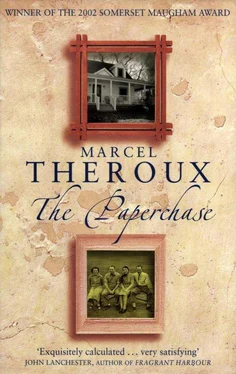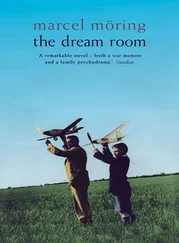I think a family is made up of people who are bound together by habit more than by ties of blood. My evidence for this is that a family can die while its nominal members are all still living. Mine did. But that afternoon, I got the feeling that I’d managed to reincarnate it. Its old habits had been revived — as though a group of people had got together and learned to speak a dead language.
I’d set up Patrick’s croquet hoops on the flattest part of the lawn. It wasn’t real croquet, it was a variant, a dialect of the game that Patrick had half remembered and half made up. But since we had never played anything else, it had always been croquet to us.
After we’d finished eating and had a short rest, I explained the game to everyone who wanted to play. Winks couldn’t, Officer Topper had to go back to work and Mrs Fernshaw didn’t want to, but everyone else was up for it. Only William Ricketts raised objections to the unorthodox rules, but he was too hesitant to offer an alternative and just carped quietly from the sidelines as I ran through my version of them.
I teamed up with Mrs Delamitri and Stephanie the paralegal; Nathan with his sister; William Ricketts with Mrs Delamitri’s artistic friend, whose house guests played as a threesome with Mr Diaz.
I suppose we’d been playing for about half an hour when the sound of an engine must have become audible from the driveway. I say ‘must have’ because I didn’t hear it myself. I was wrapped up in the game and while I tried to retain a relaxed and casual appearance I was determined to batter William Ricketts’ ball into the salt marsh.
There must have been the sound of an engine, logically, because a car was arriving. But the first I was aware of it was when I saw my Aunt Judith’s head peering around the side of the house, shortly followed by her waving hand and then the rest of her body. Just behind her was her husband, Lynde, a retired high-school gym instructor, who had been a silent and unfathomable accessory at family reunions for as long as I could remember.
I was surprised to see them — I wasn’t sorry, but I knew it must have been a long trip and I had invited them more for the sake of form than in the belief they’d really show up. But I was more surprised to see that my brother Vivian was bringing up the rear.
But I was pleased, almost in spite of myself, to see him loping across the lawn behind them. There was an uncomfortable moment when I forgot to detach myself from my croquet mallet to shake his hand, but the greetings over, I was able to conceal my awkwardness by officiously discharging my duties as host.
My brother had driven down with a friend — a bit of blonde eye-candy who was younger and more silent than Terry Fernshaw. My brother was looking tanned and muscular. I caught him admiring his own biceps as he held a cup of iced tea in front of him. Why a film director should want to emulate a leading man, I don’t know. I would have thought that one of the perks of the job was being able to exude some status-related sex hormone without going to the trouble of breaking a sweat at the gym. Anyway, he made me feel very pasty and English.
It might have been my paranoia, but I think that a slight buzz went around the garden when he arrived. People are like that about celebrity; and they’re noticeably less good at concealing their interest when the person in question is someone they think they ought to know but can’t quite place.
‘Was October Conspiracy one of your brother’s?’ William Ricketts asked me discreetly.
‘Yes,’ I said.
‘Oh, that was jolly good. Yes, I enjoyed that.’
He worked up his courage to pass on the compliment to my brother, who was obliged to inform him that he’d had nothing to do with it.
Most of the guests began to disperse around four. Several were returning to the mainland as I was and had long journeys home. But the Fernshaws and Winks and Mr Diaz had gone down to the beach for a swim. I walked down to tell them I was getting a lift to Boston with Vivian.
I said goodbye and exchanged a wordless farewell with Mrs Fernshaw, who gave me a hug. As my cheek brushed the side of her head, I found myself looking at the silent zone around her ear. Even if we had shared a language, I wouldn’t have been able to say much more than goodbye, or begin to explain that something I had found in her story was sending me across the world to find the conclusion of my own.
As I left the beach afterwards, I turned back for a last look. A mass of clouds had formed over the eastern end of the island — their undersides were just touched with pink as the sun dipped on the other side. Terry and her mother were scouring the lower part of the shore for sea glass. Mr Diaz and Nathan had taken the turtle boat into the water and were floating it in the shallows between the shore and the sandbar. Winks had rolled up his trousers and was hopping at the water’s edge with his crutch. Occasionally he used it to point at something — the moat of water around the sandbar was full of starfish, sand dollars and flickering shoals of minnows — and the crutch cast a long whisker of shadow along the beach.
For a brief moment, there was one of those special conjunctions of the season, and the weather and the company — all of them, even William Ricketts — that brought the present into sudden communion with the past. That could almost have been Patrick playing in the water, or my grandmother collecting sea glass. It was as though the past had been brought to life in front of me — the past that at all other times was no more than a handful of August afternoons as faint and distant as the lights of a remote constellation.
VIVIAN HAD SOME KIND of Japanese off-road vehicle that seemed only slightly smaller and less robust than the amphibious vessels they used for landing troops on D-Day. Even so, he cringed when I closed the passenger door and complained that I’d slammed it.
‘Do you want to slam it a bit harder?’ he said. ‘There’s a woman in Provincetown who didn’t hear you that time.’
I opened the door and shut it again as delicately as a surgeon lowering a new heart into a patient’s rib cage. ‘Better?’
‘I bet you don’t shut the door of your car like that,’ he grumbled as we turned out of the driveway of my uncle’s house for perhaps the last time in our lives. ‘Not that that shit-box would ever have made it as far as Boston.’
I began to regret having accepted the lift, but the alternative would have been a taxi and then the bus.
We drove mostly in silence to the ferry port at Westwich.
Vivian’s prepubescent girlfriend fell asleep on the back seat with her feet on the sofa-sized armrest that separated me from my brother. She remained comatose all the way to Westwich, slept through the ferry crossing, and only opened her eyes briefly when we arrived on the mainland.
I felt a slight ache at the thought of leaving. The dense pine trees that stretched away on either side of the highway and the dusty golden light of late afternoon on the Cape seemed so familiar that I found it painful to think I might revisit it again only as a memory.
‘Dad was ill,’ Vivian said, apropos of nothing, as the car rumbled up Route 6 towards Boston.
‘Judith didn’t mention anything.’
‘I imagine he didn’t tell her. You know what he’s like.’
‘Is he all right?’
‘He’s over it now. I had my assistant call you at the time but she said some fucking Russian guy kept answering the phone.’
‘You had your assistant call me?’
‘You never return my calls anyway, so what difference does it make?’
‘What was wrong with him?’
‘He had a medical in Boston while he was over for Patrick’s funeral — he must have felt he was next in line for the big guy with the sickle. He called me up afterwards to brag.’ Vivian lowered his voice in an impression of my father’s drawling mid-Atlantic accent: ‘“Blood pressure one forty over eighty-five, they said I had the eyes of a fighter pilot, I could have run on that treadmill all week. Nothing wrong with your genes, Vivian.”’
Читать дальше












